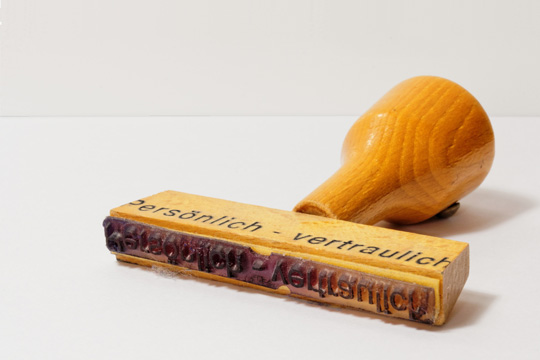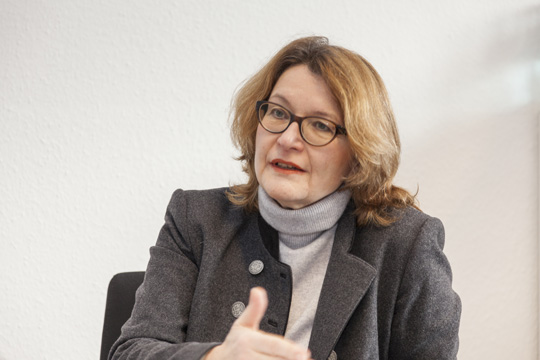"A person who is under suspicion deserves a fair hearing"
Freiburg, Jul 28, 2017
Confidentiality and transparency: these two terms were at the heart of a panel debate in July 2017 as part of the Freiburg talks on academic integrity. Claus Schneggenburger, former head of the SWR-Studio Freiburg, emphasized the essential role of the media in informing citizens, while Prof. Dr. Uwe Blaurock, Representative for responsibility in academic research at the University of Freiburg, argued for the occasional need to clarify questions in camera first of all. But what information does the University in fact release in response to inquiries from journalists? How do you deal with cases of suspected plagiarism or data falsification? Is it at all possible to work properly and efficiently with the pressure there is these days to publish? Rimma Gerenstein discussed this with Prof. Dr. Gisela Riescher, vice president for research integrity, gender, and diversity.
 Foto: Pixabay
Foto: Pixabay
Ms Riescher, the panel debate revolved around confidentiality and transparency. Are these concepts antithetical?
Gisela Riescher: Confidentiality and transparency are sometimes in opposition to one another, but sometimes they go hand in hand. They are mutually exclusive if we want to guarantee someone who is under suspicion of having committed academic misconduct a fair hearing: in this case confidentiality must come first. But confidentiality and transparency are complementary once the proceedings have been completed: then we release the information and provide transparency.
 When the media publish the names of researchers who are under suspicion of academic misconduct it can cause irreparable harm, says Gisela Riescher.
When the media publish the names of researchers who are under suspicion of academic misconduct it can cause irreparable harm, says Gisela Riescher.
Photo: Ingeborg F. Lehmann
When journalists inquire into academic misconduct, these inquiries land on your desk. What information does the University release?
It is very clearly regulated: during proceedings we don't name any names, we don't make any judgments, whether ethical or moral, we don't comment on speculation and definitely not on when the committee that is entrusted with examining a case will come to a conclusion. If the persons concerned themselves go to the press and the journalists know their names, we can be slightly more transparent. But in principle the rule is: we only release information once the proceedings have been completed.
Do you understand it when journalists refuse to leave things alone?
Definitely! Asking questions is their job, and as a state university which is funded from taxes, we have a duty to keep the public informed. But our discussion session also made it clear that understanding is always an issue of reciprocity. In other words: journalists should understand that sometimes it is necessary to keep things private for a certain period.
When would this be the case?
When an individual's privacy needs to be protected. Imagine a researcher is accused of plagiarism. A newspaper publishes the name, other media become involved and spread the report. The damage caused to this person can be irreparable and destroy their entire career. And then even if the accusations turn out to be unfounded, they still remain in the public memory. The public doesn't always hear that they have been cleared. So we have to protect the members of our university with confidential proceedings. A person who is under suspicion deserves a fair hearing.
Let's assume a suspicion of plagiarism or data falsification has been substantiated. Do you think a researcher can continue to work in academia?
Like the philosopher Hannah Arendt who believed that the ability to reinvent oneself was the essence of being human, I would say that there are always new beginnings. Trust can be rebuilt, even if research into trust indicates how difficult this is. So everyone should be given the chance to prove themselves in academic life once more.
Regarding time: in recent years the pressure to publish has changed both in journalism and in academia. The slogan "publish or perish" now appears to apply to both professions. Is it at all possible nowadays to work properly and efficiently within these structures?
Journalism and academia have very different time horizons: A journalist has to respond quickly to a news report and publish it; in research you have more time to consider matters. But in both fields the same rule applies: we mustn't neglect the core principles of our work. Everything we publish must be verifiable. By the way, I also see positive developments in academic life, which help to counter the pressure and maintain our discipline at work. The guidelines of the Deutsche Forschungsgemeinschaft, for instance, no longer demand the entire list of publications along with applications but just ask for five outstanding publications that the researcher found to be relevant. This promotes quality over quantity.
You completed your dissertation in the 1980s and qualified for a teaching career in higher education in the 1990s. Was academic integrity an issue back then?
Well, it wasn't called "academic integrity" or "research integrity" then, but the issue was always there. When I was studying I took courses on the techniques of academic work: where can I find information? How do I use it? How can I show that I am using the ideas of others in my work? I can still remember the courses on citations. They brought in whole tables of books piled high with sources in Greek and Latin. And you had to work with this. Believe me, it wasn't always that interesting. But in the end you knew how to write a term paper. And I learned a fundamental requirement of academic work on these courses: academic means verifiable. We have to be able to verify something in order to comprehend it – and also to refute it.
What happens when academic misconduct is suspected?
What happens at the University of Freiburg when an allegation of academic misconduct is made?
Information is generally passed first of all to the Representative for responsibility in academic research, the legal academic Prof. Dr. Uwe Blaurock. Acting as a kind of ombudsman, he undertakes an initial examination of plausibility.
If the accusation is substantiated, the Representative generally passes the matter to the Investigative Commission on Academic Integrity, which goes into the case in more detail. The commission has an official duty of confidentiality.
Finally, the commission writes an assessment report, based on which the Rector decides what has to be done – e.g. disciplinary consequences or passing on to the examination committee of a faculty. They alone can decide, for instance, whether a researcher's doctorate is withdrawn.
Information on academic integrity

